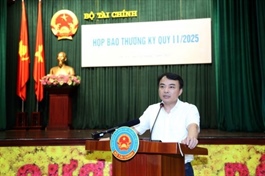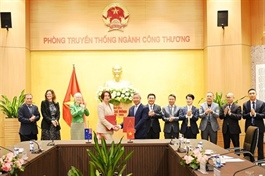UBO concept to be put into legal practice
UBO concept to be put into legal practice
Vietnam has embraced specific regulations on ultimate beneficial owners in its revised business law to make its business and investment climate more transparent in line with international practices.

Identifying ultimate beneficial owners of companies helps prevent wrongdoing Photo: Le Toan |
The National Assembly (NA) a fortnight ago adopted a new law amending and supplementing a number of articles of the Law on Enterprises 2020. The fresh law, compiled by the Ministry of Finance, aims to solve shortcomings of the Law on Enterprises 2020, and create a favourable and safe investment and business climate for businesses.
One of the most noteworthy points in the new law is that for the first time, the concept of “ultimate beneficial owner (UBO) of enterprises” is introduced to promote transparency in business ownership, meet the Financial Action Task Force (FATF) standards on anti-money laundering and address Vietnam’s placement on the FATF grey list.
Under the draft law, the UBO with a legal personality is defined as “an individual who has actual ownership of the charter capital or has the right to control that enterprise, except for the case of the direct owner representative at an enterprise in which the state holds all of the charter capital and the representative of the state capital invested in a joint stock company or a limited liability company with two or more members according to the provisions of law on management and investment of state capital in enterprises”.
The law’s Article 5 has been added a new regulation, stating that enterprises shall have to collect, update, and store information on the UBOs; provide information for the competent state agencies to determine the UBOs when requested.
Enterprises also shall have to provide the list of shareholders founding the enterprises, the list of shareholders being foreign investors, and the list of the UBOs, if any.
The list of the UBOs must cover specific information including full name, birthday, nationality, gender, contact address, the rate of ownership or right to control the enterprise, and legal documents.
Article 216 has been supplemented with a new point, stating that enterprises shall have to “store information about the UBOs within at least five years since the enterprise disbands or declares bankruptcy under the regulation of the law.”
Article 217 has also been added a new point, reading, “The government shall provide detailed regulations about criteria to determine the declarer(s) and the declaration of the information of UBOs and the information used to determine UBOs, as well as the provision, storage, and sharing of information about UBOs.”
The government reported to the NA that identifying UBOs and providing information about them are important measures to prevent and combat commercial fraud, tax evasion, corruption, money laundering and terrorist financing.
“In fact, our country has undergone a situation of ‘hidden ownership’ with many cases of organisations and individuals controlling enterprises with a lack of transparency, abusing their position of controlling enterprises to commit acts of corruption, money laundering and other violations of the law,” stated Minister of Finance Nguyen Van Thang. “This not only causes damage to investors, partners, customers, and social communities, but also reduces trust, increases risks and negatively affects the development of the business sector and the economy.”
More than 160 countries have applied similar regulations. In Singapore, the United Kingdom, Germany or Japan, UBOs’ information is mandatory for business registration.
According to experts, in enterprises, the legal owner is only the person whose name is on the asset, while the UBO is the real owner and the person who actually controls that asset. The asset can refer to a normal asset, a company, and a financial fund. The agreements between the legal owner and the UBO are private ones that only the two parties know about.
“UBOs sound strange, but actually still exists in Vietnam, through the form of disguised or “named for” investment. This structure covers that asset with a vague legal shell, lacking transparency, at least from the public’s perspective,” writes Tran Huu Tien and Le Thanh Tam from law firm Global Vietnam Lawyers.
In 2007, Vietnam became a member of the Asia/Pacific Group on Money Laundering, an inter-governmental organisation, consisting of 42 member jurisdictions. As a member, Vietnam has participated in its multilateral assessments according to the methodology based on the 40 recommendations of the FATF.
Under the Multilateral Assessment Report on Anti-Money Laundering, Vietnam has been included in the enhanced review process and the review process of countries with serious deficiencies of the FATF for a period of one year (from March 2022 to March 2023), and Vietnam must overcome the deficiencies identified in the report. However, after the end of this period, Vietnam has failed to meet the requirements for improving the legal framework.
In June 2023, the FATF officially put Vietnam on the grey list, officially known as the Enhanced Monitoring List, and asked Vietnam to take corrective actions as specified by the FATF within two years.
According to the International Monetary Fund, a country being put on the grey list will experience a significant reduction in foreign investment flows into that country, of about 7.6 per cent of the country’s total GDP.
- 15:18 03/07/2025



























